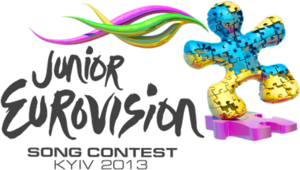Junior Eurovision Song Contest 2013
| Junior Eurovision Song Contest 2013 | |
|---|---|
| Be Creative | |
 |
|
| Dates | |
| Final | 30 November 2013 |
| Host | |
| Venue | Palace "Ukraine", Kiev |
| Presenter(s) |
Timur Miroshnychenko, Zlata Ognevich |
| Director | Viktor Knysh |
| Executive supervisor | Vladislav Yakovlev |
| Executive producer | Victoria Romanova |
| Host broadcaster | National Television Company of Ukraine (NTU) |
| Interval act |
|
| Participants | |
| Number of entries | 12 |
| Debuting countries |
|
| Returning countries | |
| Withdrawing countries | |
| Vote | |
| Voting system | Each country awards 12, 10, 8–1 points to their 10 favourite songs. |
| Winning song |
"The Start" |
| Junior Eurovision Song Contest 2013: Kyiv | ||||
|---|---|---|---|---|
 |
||||
| Compilation album by Junior Eurovision Song Contest | ||||
| Released | 22 November 2013 | |||
| Genre | Pop | |||
| Length |
|
|||
| Label | Universal | |||
| Junior Eurovision Song Contest chronology | ||||
|
||||
The Junior Eurovision Song Contest 2013 was the 11th annual Junior Eurovision Song Contest. It took place in Kiev, Ukraine on 30 November 2013. The venue for the contest was announced on 10 April 2013, as the Palace "Ukraine". Ukrainian broadcaster National Television Company of Ukraine (NTU) was the host broadcaster for the event. It was the second time the contest was held in Kiev, the first being the 2009 contest. It was also the second time in the history of the Junior Eurovision Song Contest that the event took place in last year's winning country, as well as the first time that the event was held in the same city twice. A total of twelve countries participated, with Macedonia and Malta making a return, and Albania,Belgium and Israel choosing to withdraw.San Marino made their debut in the contest.Cyprus was originally the thirteenth country to take part but pulled out the last minute.
On the evening of the contest Ruslana withdrew from appearing in the contest because of sickness.Gaia Cauchi representing Malta won the contest with the song "The Start". This was Malta's first Junior Eurovision victory as well as their first victory in any Eurovision Contest. It also marked the first time in the history of the contest that a winning entry was sung entirely in English. This was also the first contest to introduce a new awards system: The winning country along with the second and third place countries each received a trophy. Sofia Tarasova, representing the host nation Ukraine, took second place and Ilya Volkov singing for Belarus took the third-place trophy.
...
Wikipedia


